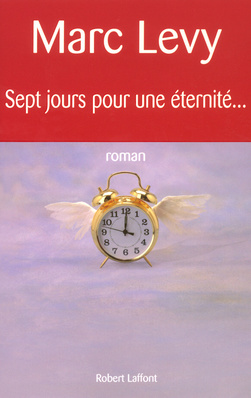

Marc Levy · 281 pages
Rating: (4.8K votes)
“Il suffit d’une minuscule graine d’espoir pour planter tout un champ de bonheur… et d’un peu de patience pour lui laisser le temps de pousser.”
― Marc Levy, quote from Sept jours pour une éternité...
“[Dieu:] Est-ce vraiment moi qui ai inventé l'amour, ou est-ce l'amour qui m'a inventé?”
― Marc Levy, quote from Sept jours pour une éternité...
“Cuceririle amoroase sunt cele mai egoiste dintre cruciade.”
― Marc Levy, quote from Sept jours pour une éternité...
“Savoir simplement que tu es là quelque part sur cette terre sera, dans mon enfer, mon petit coin de paradis.”
― Marc Levy, quote from Sept jours pour une éternité...
“– Tu t'es beaucoup ennuyée?
– Soixante-quatre voitures sont passées dans ta rue, dont dix-neuf vertes!”
― Marc Levy, quote from Sept jours pour une éternité...

“Fiecare oglindă îţi oferă imaginea unui spectacol jucat fără niciun spectator, în care actriţa e propria-ţi mizerie.”
― Marc Levy, quote from Sept jours pour une éternité...
“Lucrul cel mai bun din noi e ascuns pe undeva şi trebuie să-i dăm o mână de ajutor ca să-şi deschidă aripile, nu să le sufoce.”
― Marc Levy, quote from Sept jours pour une éternité...
“L'amore è una particella di speranza, l'eterno rinnovarsi del mondo, il sentiero della terra promessa, colui che trova la sua metà diventi più completo dell'umanità intera. non è l'uomo che è unico in se stesso, è nel momento in cui comincia ad amare che lo diventa.”
― Marc Levy, quote from Sept jours pour une éternité...
“Richard Lee calculated that a Bushman child will be carried a distance of 4,900 miles before he begins to walk on his own. Since, during this rhythmic phase, he will be forever naming the contents of his territory, it is impossible he will not become a poet.”
― Bruce Chatwin, quote from The Songlines
“Waiting for my real life to start is no excuse to waste the life I have right now.”
― Susane Colasanti, quote from So Much Closer
“The Tezuman priests have a sophisticated calendar and an advanced horology," quoted Rincewind.
"Ah," said Eric, "Good."
"No," said Rincewind patiently. "It means time measurement."
"Oh.”
― Terry Pratchett, quote from Eric
“A man needs a much bigger orbit than a woman. He needs a mission, a life purpose, and he needs to know his name. Only then is he fit for a woman, for only then does he have something to invite her into.”
― John Eldredge, quote from Wild at Heart: Discovering the Secret of a Man's Soul
“Hell,’ I tell her, ‘is where all the interesting people are.”
― Hannu Rajaniemi, quote from The Quantum Thief
BookQuoters is a community of passionate readers who enjoy sharing the most meaningful, memorable and interesting quotes from great books. As the world communicates more and more via texts, memes and sound bytes, short but profound quotes from books have become more relevant and important. For some of us a quote becomes a mantra, a goal or a philosophy by which we live. For all of us, quotes are a great way to remember a book and to carry with us the author’s best ideas.
We thoughtfully gather quotes from our favorite books, both classic and current, and choose the ones that are most thought-provoking. Each quote represents a book that is interesting, well written and has potential to enhance the reader’s life. We also accept submissions from our visitors and will select the quotes we feel are most appealing to the BookQuoters community.
Founded in 2023, BookQuoters has quickly become a large and vibrant community of people who share an affinity for books. Books are seen by some as a throwback to a previous world; conversely, gleaning the main ideas of a book via a quote or a quick summary is typical of the Information Age but is a habit disdained by some diehard readers. We feel that we have the best of both worlds at BookQuoters; we read books cover-to-cover but offer you some of the highlights. We hope you’ll join us.